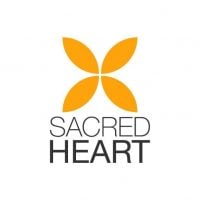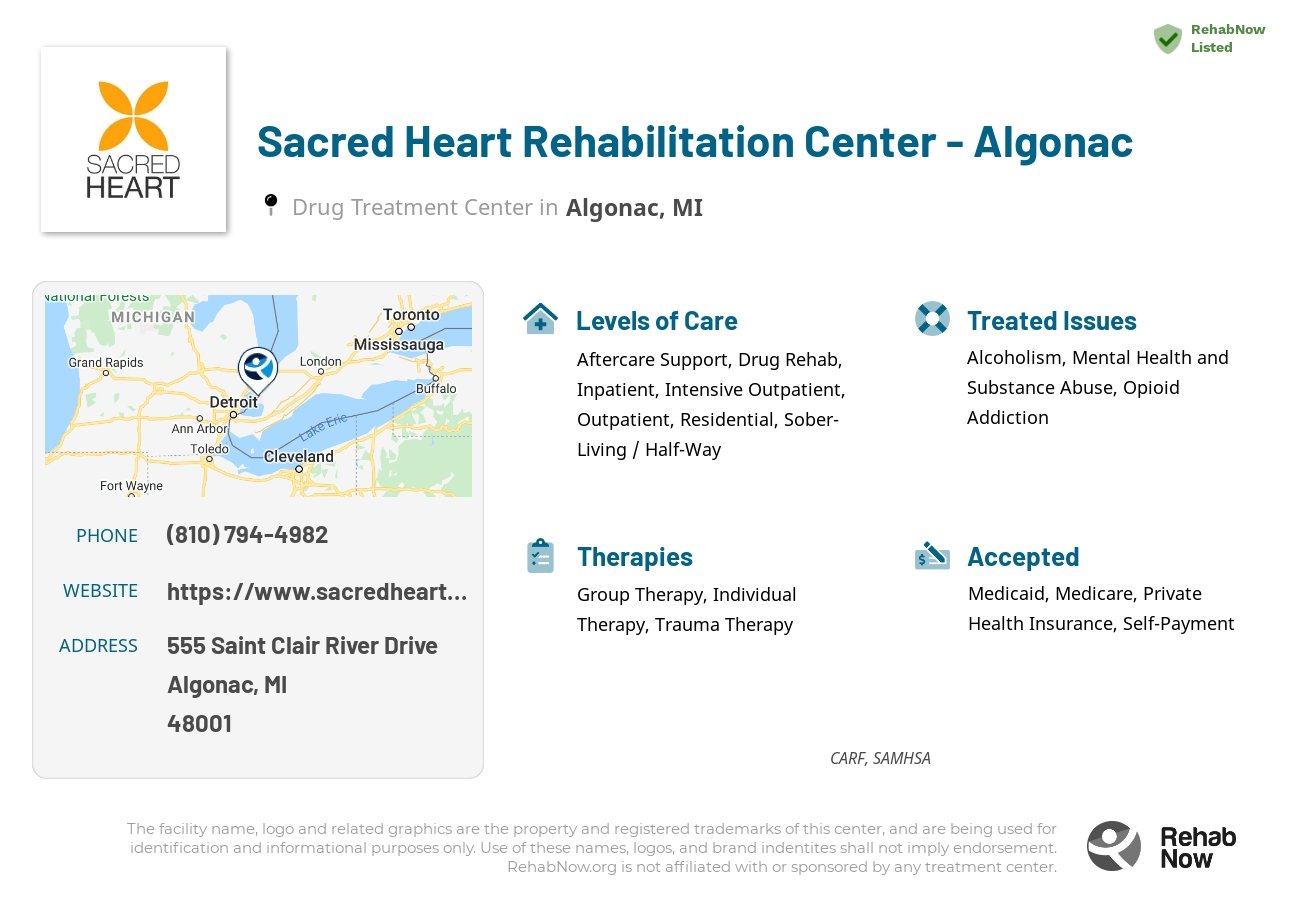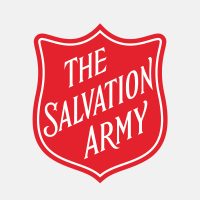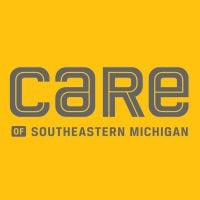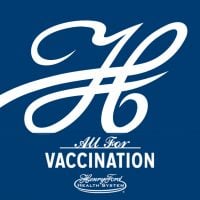Sacred Heart Rehabilitation Center - Algonac
Drug Rehab Center in Algonac, Michigan
Sacred Heart Rehabilitation Center in Algonac, Michigan offers comprehensive and individualized treatment for substance abuse and addiction using evidence-based and holistic methods, and is accredited and licensed by various organizations.
About Sacred Heart Rehabilitation Center - Algonac in Michigan
Sacred Heart Rehabilitation Center - Algonac, located in Algonac, Michigan, is an Addiction Treatment Facility that has been providing comprehensive care for individuals suffering from alcoholism, drug addiction, dual diagnosis, and opioid addiction since its establishment in 1967. The center is accredited by the Commission on Accreditation of Rehabilitation Facilities (CARF) and is also recognized by the Substance Abuse and Mental Health Services Administration (SAMHSA). This recognition demonstrates their commitment to maintaining high standards of care and ensuring that their programs and services meet the needs of their patients.
Sacred Heart Rehabilitation Center - Algonac offers a range of treatment services to address addiction and substance abuse issues. Their programs include inpatient, outpatient, residential, and intensive outpatient options, allowing individuals to receive the level of care that is most appropriate for their specific needs. Additionally, the center provides aftercare support and sober-living/half-way levels of care, recognizing the importance of ongoing support and assistance in maintaining long-term recovery. Through their comprehensive approach, Sacred Heart Rehabilitation Center - Algonac aims to address the physical, emotional, and psychological aspects of addiction, helping individuals overcome their struggles and achieve lasting sobriety.
Genders
Ages
Modality
Additional
Accreditations
SAMHSA

CARF
The Commission on Accreditation of Rehabilitation Facilities (CARF) is a non-profit organization that specifically accredits rehab organizations. Founded in 1966, CARF's, mission is to help service providers like rehab facilities maintain high standards of care.
Conditions and Issues Treated
Many people who struggle with opioid addiction need to attend specific programs like methadone , Suboxone or Vivitrol clinics.
These types of programs will provide the patient with legal, prescription medications that can help them overcome their cravings for illegal opioids like heroin or fentanyl . If the patient has a chronic condition like Hepatitis C, they must undergo treatment before they can begin taking these medications.
Levels of Care Offered
This center offers a variety of custom treatment tailored to individual recovery. Currently available are Aftercare Support, Drug Rehab, Inpatient, Intensive Outpatient, Outpatient, Residential, Sober-Living / Half-Way, with additional therapies available as listed below.
Inpatient treatment is an intensive program that takes place when a patient checks into a rehabilitation facility. The treatment includes detoxification and counseling sessions, which are round the clock. Outpatient treatments are also available, but inpatient care is advised as the first step of rehabilitation.
Intensive rehab ensures the patient stays in a substance-free atmosphere, improving treatment success rates. The patient participates in group therapy for motivation from other patients who have overcome addiction. Family members are also involved in providing emotional support throughout the program.
An intensive outpatient program is usually the first phase of addiction treatment. It provides relief for those who are addicted, but are not ready to commit to an inpatient setting. Typically, the patient lives at home and is able to work or go to school. IOPs consist of a daily 3 to 5-hour program, and there is a required number of hours per week. Most patients go to IOP between 20 and 40 hours per week. The patient attends group counseling and individual therapy throughout the duration of treatment. They also meet daily with their therapist to discuss how it’s going and where they are in the recovery process.
The goal here is to teach patients healthy coping skills, such as stress management and identifying thoughts and behaviors that lead to relapse. The implementation of these skills will be useful as the individual transitions into the next phases of treatment.
An outpatient treatment program is set up to help with alcohol or drug addiction, or a co-occurring disorder. The patient must attend the Michigan facility for their therapy and other programs but are able to return home each night. The frequency of mandatory attendance decreases after much of Sacred Heart Rehabilitation Center - Algonac‘s program is complete.
Sober Living Homes are an option for those who have completed a treatment program within the past several months. However, it isn’t advisable to use this as a permanent living arrangement because it can lead to a relapse .
The goal of a sober living home is to provide a supportive environment for recovering addicts so they don’t need to return to their previous lifestyles. The homes will not accept residents who are still using drugs or alcohol, and those living in the house must follow a set of rules dictating how they should behave to avoid relapsing.
Residential treatment programs are those that offer housing and meals in addition to substance abuse treatment. Rehab facilities that offer residential treatment allow patients to focus solely on recovery, in an environment totally separate from their lives. Some rehab centers specialize in short-term residential treatment (a few days to a week or two), while others solely provide treatment on a long-term basis (several weeks to months). Some offer both, and tailor treatment to the patient’s individual requirements.
Aftercare is a term that’s used to refer to any sort of continuing care offered for a drug addict who has voluntarily entered a rehabilitation program. This type of care can be provided in several settings, including outpatient therapy sessions after the addict has completed an inpatient program. There are also 12-step support groups, such as Alcoholics Anonymous, which can provide additional help for addicts trying to stay sober.
Therapies & Programs
Individual Therapy is a critical component of addiction recovery. Therapists work with patients to identify the root of their addiction and figure out how to better handle the issues that led to them using drugs. Individual Therapy is the one-on-one session where people meet with their therapist. Individual therapy provides a safe space for people to open up and discuss personal and sensitive topics which they may not feel comfortable discussing in a group setting.
Group Therapy is utilized by drug treatment centers like Sacred Heart Rehabilitation Center - Algonac to provide the recovering drug addict with a platform to talk about their feelings and experiences. It also provides for an opportunity to learn from other addicts who have successfully overcome their addiction.
Group Therapy is employed in lectures, seminars, or discussion groups (the latter two are typically conducted as “therapy groups”). It is recommended that all group members be recovering addicts for this type of therapy to work (though it does not exclude others with lived experience).
Trauma therapy is a clinical process that helps individuals deal with mental stress often caused by traumatic events. It is generally done for children, teenage victims of sexual assault, and war veterans. The therapist helps the person identify, understand and work through the problem. This is done with the help of talking about it in group or one-on-one counseling sessions. Therapists use relaxation, role-playing, art, and music to help the person open up about what is bothering them.
Cognitive behavioral therapy is also a popular service for individuals living with addiction. This type of supportive treatment uses both one-on-one counseling and group sessions to teach addicts how to identify thoughts, behaviors and emotions that might increase their risk of relapse.
These professionals can help addicts develop coping skills for managing stress, improving self-esteem and overcoming triggers. They might also use behavioral therapy to help addicts learn how to avoid cravings and warning signs that could lead them back into addiction.
Therapy can be used as a step-down from inpatient treatment or as the primary method of overcoming an addiction. No matter which option is best for the addict, they will teach important emotional coping techniques, which can make it easier for addicts to get through the tough days.
Payment Options Accepted
For specific insurance or payment methods please contact us.
Is your insurance accepted?
Ask an expert, call (888) 674-0062
Sacred Heart Rehabilitation Center Associated Centers
Discover treatment facilities under the same provider.
- Sacred Heart Rehabilitation Center - Richmond in Richmond, MI
- Sacred Heart - Berrien Center in Berrien Center, MI
- Sacred Heart - Madison Heights in Madison Heights, MI
- Sacred Heart Rehabilitation Center - Flint in Flint, MI
- Sacred Heart - Saginaw in Saginaw, MI
Learn More About Sacred Heart Rehabilitation Center Centers
Additional Details
Specifics, location, and helpful extra information.
Algonac, Michigan 48001 Phone Number(810) 794-4982 Meta DetailsUpdated November 25, 2023
Staff Verified
Sacred Heart Rehabilitation Center - Algonac Patient Reviews
There are no reviews yet. Be the first one to write one.
Algonac, Michigan Addiction Information
Michigan has the second-highest rate of drug and alcohol abuse in the nation. Heroin is linked to more than 50% of the state's hepatitis C cases. Marijuana is the drug most often associated with crimes in Michigan, followed by methamphetamines. Opioids alone are responsible for almost 20% of all drug overdose deaths in Michigan.
Treatment in Nearby Cities
- Alpena, MI (175.1 mi.)
- Kingsford, MI (351.6 mi.)
- Bessemer, MI (456.7 mi.)
- Saint Joseph, MI (205.3 mi.)
- Wakefield, MI (451.9 mi.)
Centers near Sacred Heart Rehabilitation Center - Algonac
The facility name, logo and brand are the property and registered trademarks of Sacred Heart Rehabilitation Center - Algonac, and are being used for identification and informational purposes only. Use of these names, logos and brands shall not imply endorsement. RehabNow.org is not affiliated with or sponsored by Sacred Heart Rehabilitation Center - Algonac.
